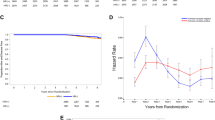Abstract
Hormone receptor (HR) status is an important prognostic factor for patients with metastatic breast cancer (MBC) and is also correlated with other prognostic factors, such as initial lymph node status, HER2-Neu status and age. The prognostic value of these other factors, however, is unknown when stratified by HR positive versus HR negative patients. The aim of this study was to evaluate prognostic factors for MBC survival in relation to HR status. Dutch women diagnosed with breast cancer in 2003–2006 treated with curative intent who developed MBC within 5 years of follow-up were selected from the Netherlands cancer registry (N = 2,001). Independent prognostic factors for survival after metastatic occurrence were determined by multivariable Cox survival analyses stratified by HR status. Interactions between HR status and prognostic factors were determined. Median survival for MBC patients with HR negative (HR−) tumours was 8 months, compared to 19 months for HR positive (HR+) patients. The prognostic value of lymph node status, HER2-Neu status, adjuvant endocrine treatment and first-line palliative chemotherapy was dependent on HR status. Initial lymph node status was independently associated with survival in HR− patients, but not in HR+ patients. HER2-Neu positive status was associated with better survival in both HR+ and HR− patients, although the association was stronger in HR− patients. Similarly, patients treated with first-line palliative chemotherapy fared better, especially HR− patients. HR+ patients had worse survival if they had received adjuvant endocrine treatment. This study shows that the prognostic value of various factors depends on HR status in MBC. This information may help physicians to determine individual prognostic profiles and therapeutic strategies for MBC patients.

Similar content being viewed by others
References
Gennari A, Conte P, Rosso R et al (2005) Survival of metastatic breast carcinoma patients over a 20-year period: a retrospective analysis based on individual patient data from six consecutive studies. Cancer 104:1742–1750
Giordano SH, Buzdar AU, Smith TL et al (2004) Is breast cancer survival improving? Cancer 100:44–52
Insa A, Lluch A, Prosper F et al (1999) Prognostic factors predicting survival from first recurrence in patients with metastatic breast cancer: analysis of 439 patients. Breast Cancer Res Treat 56:67–78
Largillier R, Ferrero JM, Doyen J et al (2008) Prognostic factors in 1,038 women with metastatic breast cancer. Ann Oncol 19:2012–2019
Planchat E, Durando X, Abrial C et al (2011) Prognostic value of initial tumor parameters after metastatic relapse. Cancer Invest 29:635–643
Chang J, Clark GM, Allred DC et al (2003) Survival of patients with metastatic breast carcinoma: importance of prognostic markers of the primary tumor. Cancer 97:545–553
Clark GM, Sledge GW Jr, Osborne CK et al (1987) Survival from first recurrence: relative importance of prognostic factors in 1,015 breast cancer patients. J Clin Oncol 5:55–61
Yamamoto N, Watanabe T, Katsumata N et al (1998) Construction and validation of a practical prognostic index for patients with metastatic breast cancer. J Clin Oncol 16:2401–2408
Fritz A, Percy C, Jack A, Shanmugarathnam K, Sobin L, Parkin DM. International Classification of Diseases for Oncology. therd ed. 3rd edition ed. Geneva: WHO; 2000
Sobin L, Wittekind C (2008) TNM Atlas, 6th edn. UICC, New York
Blanco G, Holli K, Heikkinen M et al (1990) Prognostic factors in recurrent breast cancer: relationships to site of recurrence, disease-free interval, female sex steroid receptors, ploidy and histological malignancy grading. Br J Cancer 62:142–146
Guarneri V, Bengala C, Orlandini C et al (2004) HER2 overexpression as a prognostic factor in metastatic breast cancer patients treated with high-dose chemotherapy and autologous stem cell support. Bone Marrow Transplant 34:413–417
Manders K, van de Poll-Franse LV, Creemers GJ et al (2006) Clinical management of women with metastatic breast cancer: a descriptive study according to age group. BMC Cancer 6:179
Wei S, Li Y, Siegal GP et al (2011) Breast carcinomas with isolated bone metastases have different hormone receptor expression profiles than those with metastases to other sites or multiple organs. Ann Diagn Pathol 15:79–83
Kwast AB, Groothuis-Oudshoorn KC, Grandjean I et al (2012) Histological type is not an independent prognostic factor for the risk pattern of breast cancer recurrences. Breast Cancer Res Treat 135:271–280
Early Breast Cancer Trialists’ Collaborative Group (EBCTCG) (2005) Effects of chemotherapy and hormonal therapy for early breast cancer on recurrence and 15-year survival: an overview of the randomised trials. Lancet 365:1687–1717
Kleeberg UR, Fink M, Tessen HW et al (2013) Adjuvant therapy reduces the benefit of palliative treatment in disseminated breast cancer: own findings and review of the literature. Onkologie 36:348–356
Pagani O, Senkus E, Wood W et al (2010) International guidelines for management of metastatic breast cancer: can metastatic breast cancer be cured? J Natl Cancer Inst 102:456–463
Thompson AM, Jordan LB, Quinlan P et al (2010) Prospective comparison of switches in biomarker status between primary and recurrent breast cancer: the Breast Recurrence In Tissues Study (BRITS). Breast Cancer Res 12:R92
Bogina G, Bortesi L, Marconi M et al (2011) Comparison of hormonal receptor and HER-2 status between breast primary tumours and relapsing tumours: clinical implications of progesterone receptor loss. Virchows Arch 459:1–10
Hoefnagel LD, van de Vijver M, van Slooten HJ et al (2010) Receptor conversion in distant breast cancer metastases. Breast Cancer Res 12:R75
Acknowledgement
We would like to thank the registrars of the Netherlands Cancer Registry for their effort in data gathering.
Conflict of interest
The authors declare that they have no conflict of interest.
Author information
Authors and Affiliations
Corresponding author
Rights and permissions
About this article
Cite this article
Kwast, A.B.G., Voogd, A.C., Menke-Pluijmers, M.B.E. et al. Prognostic factors for survival in metastatic breast cancer by hormone receptor status. Breast Cancer Res Treat 145, 503–511 (2014). https://doi.org/10.1007/s10549-014-2964-0
Received:
Accepted:
Published:
Issue Date:
DOI: https://doi.org/10.1007/s10549-014-2964-0




